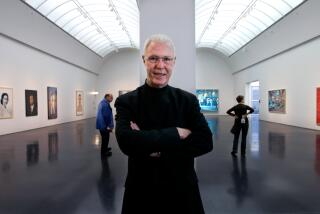Surprises and Disappointments : On Stage, Some Gambles Paid Off, Others Didn’t
Roadside Theatre had the flu; Ra-Ra-Zoo had the flubs; “Sarcophagus” had the message, but not the storytelling craft.
Yet even the bad shows in the Los Angeles Festival weren’t all that bad. And the good ones were a revelation.
Nobody had expected Robert Fitzpatrick to match the richness of the theater offerings at the 1984 Olympic Arts Festival. You were content to recall the ’84 Festival as a once-in-a-lifetime event and to judge its successor on its own terms.
But the terms were exactly the same. One could even argue that Fitzpatrick had topped himself. In ‘84, after all, he had lost Robert Wilson’s “the CIVIL warS” at the last minute. But this year’s marathon, Peter Brook’s “The Mahabharata,” arrived at the Raleigh Studios on time and within its budget--$1.9 million, more than half of Fitzpatrick’s entire production budget.
A big gamble, and it paid off: “The Mahabharata” played to full houses. But that wasn’t why Fitzpatrick had brought it to town, nor was it why he brought Ingmar Bergman’s Royal Dramatic Theatre of Sweden production of “Miss Julie” to town--without subtitles, at that. As with the ’84 festival, the idea was to offer the Los Angeles public the real thing and to let them measure up to it.
It is the only way to run an arts festival. Peter Sellars, Fitzpatrick’s successor, also operates this way, and whatever else the next festival will be, it won’t be timidly selected.
Fitzpatrick did another smart thing. He decreed that the festival shouldn’t happen every year. Sellars should also follow that tradition. It takes time to book a “Mahabharata.” Moreover, a big international festival tends to have a dislocating effect on the local performance scene.
Finally, an annual festival can get to be the same old thing. Keep it an event, not an obligation.
Fitzpatrick made a third smart decision. He opened this year’s festival with a show that everybody could relate to, Le Cirque du Soleil. This combined the charm of an old-fashioned family circus with the spacey quality of a New Age musical. It looked familiar but strange, like a homely chair seen by moonlight.
“The Mahabharata” was a true theater journey. The 11-hour marathon performance had its rigors, even for survivors of “Nicholas Nickleby.” I enjoyed the show more when I saw it on three separate evenings--not merely the watching of it, but the sense that it was sinking in during the day, without having to be thought about.
Brook’s achievement here is to show a Western audience why Indians find “The Mahabharata” a magical story, one that a person might consult in the face of a problem. He didn’t do this by giving us an exotic production, but a fairly plain one--lovely to look at, but not a riot of special effects.
The language and the acting were plain too, as if this were a children’s story. And magic was in the air. Animals could talk, spirits could take human form and a whimsical prince (Bruce Myers) could turn out to be the Son of Heaven.
What did it mean? One could see it as a warning against universal war (a link here with “Sarcophagus”), or you could read it as a pure gold-tipped fable. Brook’s actors took us to a world where choice was destiny, where opposites converged and where the most appropriate expression--the one that best covered the facts--was a slight smile.
Bergman’s “Miss Julie” took us to Sweden, one of those achingly long evenings when people succumb to their demons (a more dangerous landscape than “Babbitt’s” north woods). The acting here, especially from the women, was shockingly clear. Footnotes would have been distracting.
“Bopha” scanned the divided heart of a black South African police officer. The Wooster Group’s “The Road to Immortality” was a time trip, from the cool ‘50s to the bummed out ‘80s--a kaleidoscope of bad vibrations.
The common note in all these voyages was theatrical skill. Again, Le Cirque du Soleil provided the metaphor. “I wish the stage were as narrow as the wire of the tightrope dancer, so that no incompetent would dare step upon it,” Goethe wrote. As in ‘84, we saw very little incompetence. This festival won’t make us forget its predecessor. Rather, we’ll think of them in the same breath. A twice-in-a-lifetime experience.
More to Read
The biggest entertainment stories
Get our big stories about Hollywood, film, television, music, arts, culture and more right in your inbox as soon as they publish.
You may occasionally receive promotional content from the Los Angeles Times.










